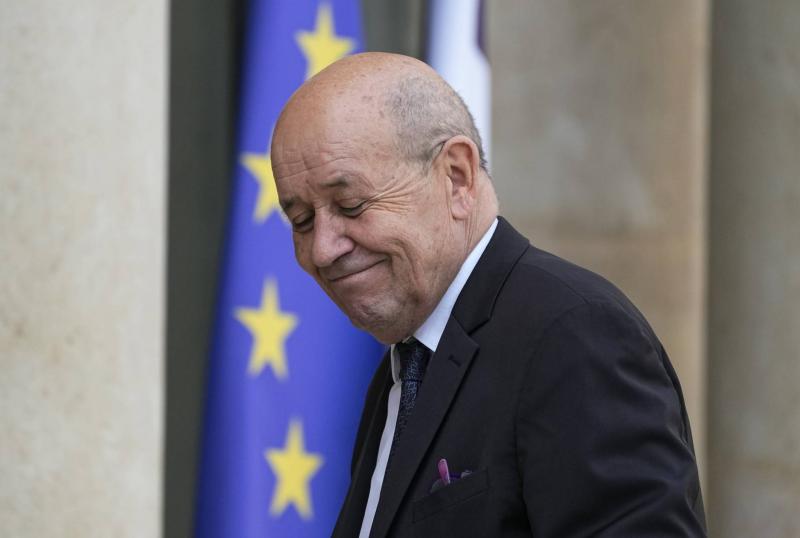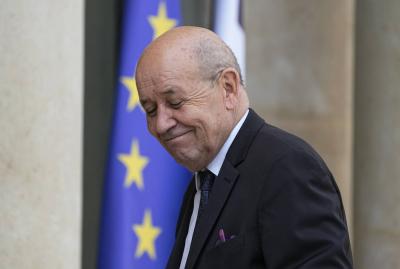In a multifaceted mission related to the developments in Gaza, French presidential envoy Jean-Yves Le Drian will arrive in Beirut tomorrow evening for a series of meetings extending until next Friday. Coming from Saudi Arabia, Le Drian brings a series of invitations and advice, benefiting from a reassessment of the situation since his last visit to Lebanon over two months ago.
According to French sources, the upcoming negotiations about the situation in Gaza will also involve southern Lebanon, necessitating the election of a new president to prepare Lebanon for negotiations. French information indicates that Israel, in implementing Resolution 1701, aims to remove pretexts for Hezbollah, as the battlefield outcomes have imposed connections in the realities of war and long-term tactical and strategic goals, in light of the international trend towards negotiations regarding the post-war phase, whether related to the two-state solution or reviving the international decisions issued by the Security Council concerning the Arab initiative and a just and comprehensive peace.
Le Drian's mission goes beyond advising the avoidance of war expansion; it also emphasizes the need to rebuild institutions, starting from the presidency to appointing a new prime minister and forming a government that includes all relevant parties represented in the parliament, enabling Lebanon to sit at the negotiating table.
Informed political sources told "Al-Liwa" that Le Drian's visit involves two aspects: first, reaffirming the importance of keeping Lebanon out of the war, and second, exploring the possibility of advancing the presidential file. His upcoming meetings are expected to provide answers about whether the parties are willing to resume discussions on the file and move towards a solution, noting that Le Drian does not bring any new data or names for discussion, while the third option remains based on discussions stemming from what the Qatari envoy proposed prior to the developments in Gaza and the south.
These sources stated that Le Drian's new mission can be seen as a starting point, and based on what he hears, he can form an idea about the next phase of work. Additionally, the sources indicated that the French envoy would not intervene in the issue of the army leadership but may seek clarification on ongoing matters. It was confirmed that extending the term of General Joseph Aoun is the option favored by the Maronite Patriarch after he expressed his stance on this issue.
Reports indicate that Qatari envoy Jassim Al Thani visited Beirut for a preliminary exploration phase before returning to Doha, with the Qatari ambassador in Lebanon continuing his communications in preparation for resuming Qatari mediation regarding the future president.
Le Drian's return coincides with a French presidential movement in the Middle East, as President Emmanuel Macron is visiting the United Arab Emirates, and it is likely that his tour will include Saudi Arabia and Qatar. In the context of French-Arab consultations, French Foreign Minister Catherine Colonna met with her Egyptian counterpart Sameh Shoukry and Saudi Prince Faisal bin Farhan while participating in the Union for the Mediterranean conference in Barcelona.
Meanwhile, in Lebanese political movement, President Najib Mikati met with Turkish President Recep Tayyip Erdogan in Istanbul. The cabinet is scheduled to hold a session next Wednesday, and there may also be a session on Thursday to discuss an agenda that does not include the issue of determining the army leadership's status. It is understood that the topic of extending General Joseph Aoun’s term is not progressing so far, neither through the government nor through the parliament.
Political sources following the ongoing communications to resolve the issue of extending General Joseph Aoun's term disclosed that the obstacle lies in the refusal of the head of the Free Patriotic Movement, MP Gebran Bassil, to this extension. Side communications to resolve this remaining obstacle have not succeeded, and on the contrary, Bassil has increased his opposition to the option of extending Aoun's term, insisting instead on allowing a lower-ranking officer in the military hierarchy to assume leadership until a new president and army commander are appointed. He has described all justifications for the extension as unrealistic and unconvincing.
Sources indicate that Bassil has informed close associates that he will continue to reject the extension of the army commander, even if he remains isolated, despite the support of most political factions for this option, including the backing of Maronite Patriarch Bechara Al-Rahi. He characterized his relationship and alliance with Hezbollah as not comprehensive across all issues, but rather selective, thus he feels no obligation to approve the extension of the army commander if Hezbollah ultimately proceeds with this option.




